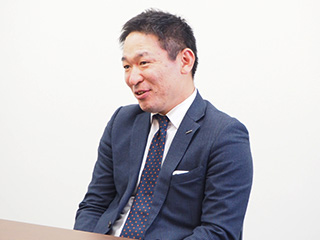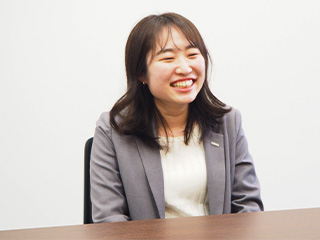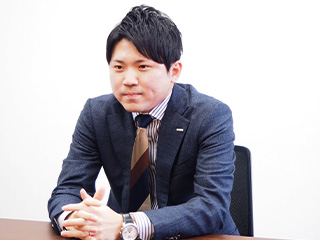In the UK, where the introduction rate of volatile renewable energy (VRE) is high, the use of regulated power sources is underway to balance power supply and demand. Nippon Koei Co., Ltd. (hereinafter referred to as Nippon Koei) has launched a project to utilize large storage batteries for the power system and contribute to solving the social problem of stabilizing the power system, aimed at transmission companies in the UK. Fuyo General Lease (hereinafter referred to as “Fuyo Lease”) has invested in this project as a joint venture, arranged project financing, and provided financing as a senior lender.
Project finance and a co-operator were needed since it is a new business in the UK
――What is the outline of this project?
Oda
Renewable energy is spreading rapidly in Europe. In particular, the UK is advanced, with a variable renewable energy (VRE) ratio powered by solar and wind power of around 26%. With the rise of the VRE ratio, there is an increasing need to stabilize the power system, and companies are introducing power storage systems for the grid that provide adjustment capacity to the grid management company.
In response to these needs in the UK, NKEE, a wholly-owned subsidiary of Nippon Koei, will become the main business, connecting large storage batteries to the power grid operated by National Grid, the major transmission company in the UK, and contributing to the stabilization of the power network. This is the summary of the project.

――How did you get involved in this project?
Sugiyama Until now, for Nippon Koei, I was only involved in leasing transactions and only had contact with the person in charge at the purchasing department. At that time, I read a press release written by Nippon Koei, and saw an article about the battery business. From there, I was able to interact with people in the energy department because I wanted to ask about the details of the business, and that led to this project. That was about three years ago.

Oda The next part to take action was our department. I have been involved in the solar power generation business for nearly 10 years, but this was a type of project that I had never worked on at Fuyo Lease. Therefore, we first discussed with Nippon Koei in order to verify the validity of the project from the structure of the UK electricity market.
Nagayasu This was a merchant-type project that traded power in the market, so it was necessary to take more risk compared to projects with fixed income expected by government subsidies and PPAs. However, a similar expansion of the market is expected in Japan in the future. In order not to miss the opportunity, we decided to participate in the UK, where the market is already in place, with the aim of accumulating knowledge of the large-scale grid storage battery business.
Engaging in new business areas and participating in new structures without fear
――What is your role in this project?
Nagayasu
The International Sales Promotion Department was responsible for arranging the project finance. This time, it has a slightly special form. Nippon Koei is the main business operator, but in addition to Fuyo Lease, three Japanese companies are also taking part in the joint venture. Our US subsidiary Fuyo General Lease (USA) Inc. provides the senior loan in the form of project finance.
In general, there are very few cases where the same company is responsible for both the senior lender role and the investment.
There is a reason why Fuyo General Lease decided to participate as the senior lender. The UK adjustment market is merchant based and the price fluctuates significantly depending on the outcome of the bid. Historical data makes it possible to make broad predictions, but in the new field of batteries, there is little data and it is difficult to make a prediction of income. With such a difficult business, there weren’t many candidates for senior lenders in the form of project finance even when we looked all over the world.
However, Nippon Koei, who was promoting the project, had a keen desire to make the project a success. Therefore, we as Fuyo Lease made careful studies to respond to that enthusiasm, and this time we decided to take on the roles of project finance arrangement and senior lender.

Oda The Energy and Environment Sales Department verified and analyzed the validity of the business plan taking the position of investor. I myself have been involved in the power generation business, and I understand the mechanism of the domestic power network to some extent, but it was extremely difficult to verify this project by utilizing the power market mechanism in the UK and the characteristics of batteries. However, while continuing discussions with Nippon Koei, we figured out the commercial viability at an early stage and quickly made internal decisions aimed at investment.
――What was the most difficult part of this project?
Nagayasu
In addition to Fuyo General Lease, some of the companies that had invested in the project made it a condition of participation to raise a loan through project finance. We also received a request from Nippon Koei, and we decided to rush to arrange the project finance.
First of all, we carefully communicated with Nippon Koei, gained a detailed understanding of market trends and aggregator strategies, and came up with a structure that could work. In addition, while interacting with British lawyers and confirming business practices and applicable laws, we talked about what form was appropriate to accommodate the request of Nippon Koei and the conditions of Fuyo General Lease.
In addition, Fuyo General Lease does not have banking capabilities and is not based in the UK. Therefore, it was necessary to clear a number of hurdles, such as preparing the operational mechanism of account management in the UK from scratch for this project, hiring agents to establish a reporting mechanism during the period, and setting up collateral for various rights in the operation of the borrower business. Clearing up these issues and creating the project finance with customization was a very difficult part of this project.
――What are the expected outcomes of this project?
Oda This large-scale grid battery storage system is scheduled to begin operation in the spring of 2023. Although the project is still in progress, we have had a very good experience and we should be able to acquire valuable know-how for the future. With this experience and know-how, we would like to make preparations to provide services smoothly to enter the adjustment capacity market that is planned to be introduced in Japan in the future.
――How do you view the future development?
Sugiyama It was a project that took a lot of time and that involved a lot of new experiences, but I found that if we collaborate with the relevant departments in the company and carefully communicate with the customers, we can tackle difficult projects. I believe that this experience will be useful in future sales activities.
Oda In recent years, the cost of storage batteries has also reduced, and good ideas can lead to new business opportunities. For example, Fuyo Lease is actively developing the PPA business, but by combining batteries, we are promoting the development of various services that utilize batteries, such as further increasing the renewable energy ratio for consumers.
Nagayasu Our International Sales Promotion Department is expanding our various overseas businesses in many fields, not just renewable energy. It should also be possible to use the basic risk analysis knowledge we gained from this project and knowledge of what kind of risk assessment is necessary in other overseas businesses. I believe that this know-how will be used in the future when trying new businesses in various countries, not just the UK.
-
*Affiliation, title at the time of interview




